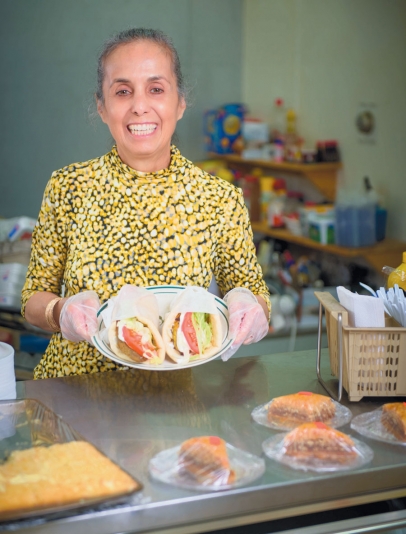The Rose Stop: The Love of 100 People, and an International Delicacy
Travel takes you to new places. It also takes you away from places – away from friends, away from family, away from familiarity. And when travel turns into a permanent state of being, when “over there” becomes “here,” expatriates, immigrants, and wanderers find ways to make a home far from home. For Rose Dadras, that place of belonging is a gas station at the intersection of South Pleasant Street and Sunset Avenue in Springdale.
The Rose Stop International Delicacy is not the average mini-mart. It’s a trove of spices, produce, and groceries from all over the Middle East. And it’s a cook’s library, in the form of Rose, a font of culinary knowledge who expertly leads customers through aisles of international ingredients.
“You take olives, add some of this pomegranate molasses, a pinch of this spice over here – it’s called angelica – and some walnuts. It makes a very tasty sweet and sour appetizer or hors d’oeuvre,” she says.
That sour flavor profile is one of the pillars of Persian cooking. Rose was born in Khorramabad in southwestern Iran in 1953. The daughter of a general in the Shah’s army, she grew up with a cook catering to her family. When, from the age of nine, Rose would sneak into the kitchen to make herself patties and other treats, the cook would guide her with the hints and tips of a seasoned chef. Married at 17, she moved to the United States in 1975, when her husband, Ali Golmirzaie, was awarded a scholarship by the Shah’s regime to study at the University of Nebraska.
Unable to read the labels of canned and prepared foods (she could not yet read English), Rose navigated her new culinary landscape by cooking everything from scratch. She could recognize fruits, vegetables, and meats from their appearance, and seasonings from their smells. As a self-taught cook, she had no need for recipe books or weight conversions.
“I never had a problem making food. I just cooked. Homemade, fresh food was all I knew.”
In 1979, a revolution happened at home. The Shah was overthrown, and Ayatollah Khomeini founded the Islamic Republic of Iran. Ali’s scholarship funds dried up. By now, he had started his doctorate at the University of Arkansas. Rose says the new regime told Ali to abandon his studies and return to Iran, but she was determined that he complete his doctorate, so she went to work in the kitchens at the university’s student union to pay for the rest of his studies. She would not go back to Iran for 18 years. Home had suddenly become very far away.
In 1982, Ali was awarded a doctorate from what is now the Dale Bumpers College of Agricultural, Food and Life Sciences at the University of Arkansas. Ali got a job in 1984 with the World Bank as the head of the department of genetics at the International Potato Center in Lima, Peru. Rose and her two young sons, Goodarz and Geeve, lived the life of the international set there. Rose had a gardener, a cook, and a maid at the house, and the boys attended a private American school.
She built a life around food and serving others. Cooking for fundraisers for local orphanages, leading cooking classes to pay for wheelchairs for the elderly, and catering an event for more than 200 people at the U.S. Embassy. She learned to speak Spanish – her third language – and learned to cook South American food. “I was trying to get involved with South American culture.” Again, Rose found a way in the kitchen.
After 16 years in Lima, her older son, Goodarz, returned to the United States to attend medical school. Rose could not bear the separation. “It wasn’t worth it,” she says. “I had been so far from my parents for so long. I was not going to be far from my kids.” So, they left the privileged life they lived in Lima and returned to Arkansas. And Rose returned to work, to put her sons through school, as she had worked to put her husband through school.
She wanted to work at something that brought her into contact with people. She worked in a department store for three and a half years. She says she was treated badly by her employers, and was forced to leave. But she missed her customers. Ali decided that a gas station would be a good fit. It was work that would give Rose a chance to interact with lots of people, and they bought the business in 2004.
At first, it was a regular gas station and mini mart. She says Ali told her to cater to American tastes for fast food with fried and processed foods. But Rose wanted to bring healthier offerings. So, she started to cook the way she had always cooked: fresh, from scratch, from the heart.
“I was trying to bring more healthy food to the gas station. I want to be close to people. And I want my customers to keep coming for a long time, so I want them to eat healthy food.”
Rose started making falafel and cutlet sandwiches and filling the chilled case in the gas station’s food court with her baked treats – recipes developed on her travels – flaky baklava, saturated tres leches, little pistachio cupcakes.
She says they lost a lot of money the first three years because people weren’t buying it. She had to throw away food (a cook’s heartbreak). Rose recalls her father coming to visit them in Springdale during those difficult first few years. Her dad was sitting by the door and calling in Persian (Farsi) to people pumping gas to come and try the delicious food. “Dad,” she told him, “they have to know you, to trust you, before they’ll eat your food. And anyway, they don’t understand Farsi.” She gets very emotional telling this story, as she deeply misses her father. All those years of separation weigh heavy.
Slowly, word about Rose’s food got around. Today, a Gulf War veteran regularly stops by for her falafel sandwich – which he calls “the best I’ve had since I left the Middle East.” Others come for the huge selection of ingredients that can’t be found anywhere else in the state. Rose has to cajole the drivers who freight the specialty produce and ingredients from California to make an out-of-the-way stop in Springdale. Once every two months, a new shipment hits the floor.
During her working life, she has put her husband, her brother-in-law, and her two sons through college. Her older son, Goodarz, is an anesthesiologist in Ann Arbor, Michigan. Geeve has a master’s degree in accounting and practices in Dallas. And now, they want her to stop so they can look after her.
Rose has scleroderma, a chronic systemic autoimmune disease that has started to attack her lungs. She is very thin, and she feels cold all the time. Her sons beg her to give up the gas station and take a rest. But, she refuses. “My customers are my batteries. They are my energy,” she says.
For Rose, food nurtures her relationships and nourishes her soul. She doesn’t taste while she cooks; she wants other people to try it first. She samples her creations through smell, saving those first bites for loved ones and regular customers. Encouraging people to eat foods they’ve never seen before, she says, “Try it, you’ll be able to taste the love.” And, in exchange, Rose makes that human connection. With tears running down her tight, frail face, she says, “I don’t know how long I have left, but, if I can take the love of 100 people with me, I’ll be happy.”
And there is the home people find with Rose when she shares her food with them. They can taste her story – her travels from Iran to Nebraska to Arkansas to Peru, and back to Arkansas. They connect to the things she’s collected along the way – recipes, friendships, and memories. And, she gets to show them where she’s from, where she’s been, where she belongs: near a kitchen.
Joint partnerships:
Hear more of Sara’s chat with Rose in episode 6 of KUAF’s Ozarks At Large food podcast.





